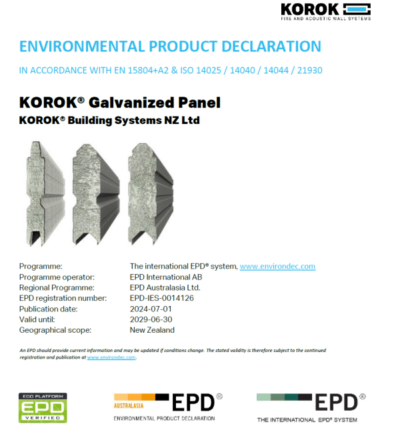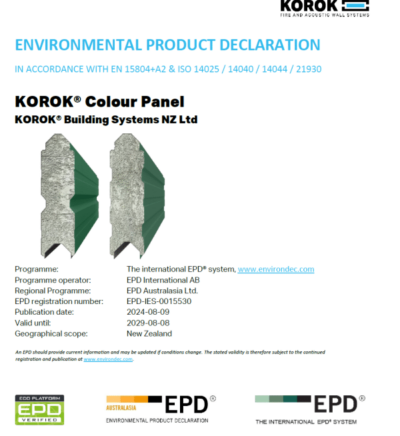At KOROK, sustainability is a core value. Our journey towards carbon neutrality is marked by significant milestones that reflect our commitment to reducing our environmental impact and enhancing the eco-friendliness of our products.
2001 Launch into New Zealand Market.
Between 2001 and 2017:
KOROK, initially launched in New Zealand as SPEEDWALL, focused on improving construction with streamlined systems that reduced waste, minimised lining needs, and boosted efficiency. Our commitment to sustainability has been integral since the start.
- Manufacturing Efficiency: Upgraded technologies to reduce energy use and optimise resources.
- Wastewater Management: A modern treatment plant for recycling and reducing water impact.
- By-product Reduction: Enhanced recycling processes to minimise waste.
2017: DECLARE Label
In 2017, we obtained the DECLARE Label, listing the ingredients in our products and aligning with the LEED green building rating system. This helped us meet industry standards and be included in GreenStar and HomeStar ratings.
April 2021: Joining NZ Green Building Council
In April 2021, we joined the New Zealand Green Building Council (NZGBC), supporting eco-friendly building practices.
December 2021: Environmental Choice New Zealand Licence
By December 2021, we obtained the Environmental Choice New Zealand Licence, recognising our products as better for the environment, enhancing our credibility among architects and builders and helping us gain accreditation for GreenStar and HomeStar products.
March 2023: Carbon Footprint Analysis
In March 2023, we conducted a carbon footprint analysis of our panels, meeting market demands and preparing for new NZ Building Code regulations.
April 2023: VOC Emissions Analysis
We analysed VOC emissions from our sealants in April 2023, addressing health concerns and meeting the demands of architects.
July 2024: Environmental Product Declaration (EPD)
In July 2024, we completed our Galv Panel Environmental Product Declaration (EPD), followed by our Colour Panel EPD in August, providing a verified summary of our product’s environmental impact over their life cycle. These EPDs are recognised internationally and often specified in tender documents and contracts.
Ongoing Carbon Reduction Efforts
Our commitment to sustainability includes ongoing initiatives to reduce our carbon footprint:
- Upgrading lighting to LEDs.
- Converting forklifts from LPG to battery power
- Recycling steel scrap.
- Recycling office and kitchen waste.
- Repurposing leftover concrete for clean fill.
- Exploring options to reuse leftover concrete and alternative fibres.
- Continuously reviewing and reducing printing.
- Factory looking at swapping from cheap throwaway pneumatic punches to something more robust (May 24)
- Even though an EPD is valid for 5 years, we will constantly review ours. We are looking forward to the changes that NZ Steel have planned for next year, moving from BOF furnaces (primary) to EAF furnaces (secondary). This will have a very positive impact on our Carbon footprint.
KOROK’s sustainability efforts highlight our commitment to reducing our environmental footprint. From the DECLARE Label to our EPDs, we continuously strive for improvement, aiming for a greener, more sustainable future.
Environmental Product Declarations (EPDs)
We are proud to announce the completion of our Environmental Product Declarations (EPDs), a testament to our commitment to transparency and sustainability. One for our Galv panel and one for our Colour panel.
What is an EPD?
An Environmental Product Declaration (EPD) is a certified, independently verified summary of a product’s environmental impact over its entire life cycle. It evaluates:
- The materials extracted from the earth.
- Energy used in the production, transportation and installation.
- The environmental impacts of using, disposing, or recycling the product.
The EPD covers a range of environmental indicators, including the potential for carbon emissions, air and water pollution, and depletion of natural resources. Based on international standards (ISO 14025 and EN 15804 for building materials), our EPD is independently verified, making it a trusted and reputable source of information. It is recognized by industries, companies, and governments, and is often specified in tender documents and contracts.
Recent Articles
Stay in the loop
Sign-up to our newsletter to be notified of updates.



